- Home
- Chris Pierson
Chosen of the Gods k-1 Page 2
Chosen of the Gods k-1 Read online
Page 2
Suddenly, he began to weep.
He tried to hold it back at first, but soon his cheeks were wet. The tears he shed were not born of sorrow, however, but of joy. He even laughed, his heart singing along with the music of the bells. Smiling, he wiped his eyes, clearing his vision-and stopped, sucking in a sudden breath.
Down the path, in the shadow of a great ebony tree, was something that did not belong in this place: a tail, grim figure swathed in black. It was a man, his dark hood covering his face save for the tip of a thick, gray beard. He stood motionless, and though he couldn’t see the man’s eyes, the First Son was sure the dark-robed figure was looking at him. The chill in the air seemed to sharpen as he met the man’s gaze.
Yes, hissed a cold voice. The hooded head inclined slightly. It will do.
Suddenly terrified, Kurnos cast about, searching for one of the Knights who patrolled the Temple grounds. There was none nearby, though-and what was more, none of the other clerics bustling past seemed to see the shadowy figure at all. Swallowing, Kurnos turned back toward the tree, intending to do something, perhaps cry out…
And stopped. The dark figure was gone.
He stepped forward, peering deeper into the shadows, but there was no sign of the man. Kurnos swallowed, shaken. Perhaps I imagined it, he told himself. I’m tired-jumping at shadows, that’s all.
In his mind, however, the dark figure remained, lurking and watching as he turned toward the basilica to greet his first day as the Kingpriest’s heir.
Chapter One
Fourthmonth, 923 LA.
The drums of war hadn’t sounded in Istar for years.
The empire had not known peace in all that time, of course-goblins and ogres still lurked in the wildlands, for one thing, despite repeated Commandments of Extermination from the Temple, as did cults that worshiped dark gods. And while most realms paid homage to the Kingpriest, some- notably the distant Empire of Ergoth-refused to do so. It was enough to keep the imperial armies from growing idle, but Istaran hadn’t fought Istaran in over half a century, since the end of the Three Thrones’ War.
The Trosedil, as the church tongue named the war, had arisen when three different men, each with their own fol-lowings, laid claim to the throne. Such factional splintering had happened before, when a Kingpriest died with no named heir, but this time it was particularly tragic. For two decades the dispute had bloodied the empire’s fields, until Ardosean IV, also known as Ardosean the Uniter, had defeated his rivals, beheading Vasari II and imprisoning Theorollyn III, thereby becoming the one true sovereign.
With the war’s end, prosperity returned to the empire. Gold flowed freely, filling the coffers of castle and temple alike. By the time the Uniter died, ten years after the Trosedil’s ending, the realm was almost completely healed, the old divisions forgotten.
Not everyone shared in the bounties of peace, however. Taol, westernmost of Istar’s provinces, had no spices, no silks. Its hills yielded copper and iron, not rubies and opals. Its people had been barbarians at the empire’s dawning, until the priests came to pacify them and teach them the ways of Paladine. Even now, they remained simple borderfolk, and though they were poor compared with people who dwelled in the lands to the east, they had long been content with their lot.
Ullas obefat, the old saying said. All things change.
The troubles had begun the previous autumn, with a blight that devastated harvests all over the borderlands. Famine followed, and with it came plague, a terrible sickness called the Longosai-the Slow Creep-that started at the provinces’ fringes and worked its way from town and town as winter came on. When they saw the troubles their people faced, the Taoli nobles had acted quickly, sending riders to the Lordcity to plead for help. Before the messengers could reach the lowlands, however, the snows had come, vicious buzzards that buried the lands and choked the roads. The riders vanished into the storm and were never seen again. The food and healers the borderfolk needed never came. The Longosai spread, made worse by starvation.
Even then, however, matters might have mended, had the first travelers to ride into the highlands when the thaws came been traders, priests, or even Solamnic Knights. Instead, however, it was the Kingpriest’s tax collectors who sojourned to Taol when the roads cleared at last. They came as they always did, at the dawning of springtime, to collect the annual tithe from the borderfolk to bring back to the holy church. What they found instead, however, were sickness, empty larders, and men and women made desperate and angry by suffering.
Inevitably, it came to bloodshed. The Scatas, the blue-cloaked imperial soldiers who accompanied the tax collectors, killed several bordermen who tried to fight The highlanders struck back, slaughtering soldiers and clerics alike. The survivors fled bask to the Lordcity, bringing word of a peasantry risen in revolt. The Kingpriest closed the roads that led to Taol and issued an edict demanding the heads of the rebels’ leaders. By the time the last snows melted, the borderlands were dry tinder, awaiting a spark. The war drums hadn’t sounded in Istar for years. They wouldn’t remain silent much longer.
Tancred MarSevrin thrashed and thrashed, fighting with all his might. He was too weak, though, and his struggles soon began to weaken, his cries grew silent. Finally he slumped, defeated, his wild, fearful eyes staring at nothing. His legs kicked one last time, then were still.
Cathan kept his hand over the dead man’s mouth, counting slowly to ten and fighting the urge to scream. Finally, knowing it was done, he pulled back and stood above the bed, staring at the body. He ran a shaky hand over his face, then reached down and closed Tancred’s eyes. Sucking in a shuddering breath, he drew a blanket over the pinched face.
“Farewell, brother,” he whispered.
The bedchamber was plain, stone below and thatch above, a closed, wooden door leading to the front room. A second blanket hung over the lone window, drenching the room in shadows. The furnishings were spare: a straw bed and two wooden stools, a foot chest with no lock, a clay chamber pot crusted with filth. The only ornament was a sacred triangle of white ceramic hanging on the east wall. No one had changed the rushes on the earthen floor in some time, and their sweet smell had long since yielded to the sour reek of sickness.
Cathan looked down at the shrouded corpse, feeling hollow. When the tears came, he let them flow.
The Longosai was a terrible way to die. It began as an innocent-looking rash on the hands and feet, but that hannlessness didn’t last long. It steadily worsened, erupting into weeping sores that crawled up arms and legs and blossomed on swollen groins and throats, wasting away the flesh and turning its victims into skeletons wrapped in loose folds of corrupted skin. As the end came on, so did madness, bringing a wild sheen to the eyes of the dying and bloody froth to their lips. Death soon followed.
The plague had missed the village of Luciel as it raged across Taol, somehow leaving it untouched all winter while ravaging the hamlets nearby. Oveth, Fliran, even Espadica only two leagues away had all succumbed, but when the snows finally began to melt, Luciel remained intact. The townsfolk had sighed, thanking the gods they had survived such a harsh season… then, on the third day of spring, they’d begun to die.
Drelise had been the first victim. A priestess of Mishakal the Healing Hand, she had been an old woman-the winter just past her ninetieth-and her goddess hadn’t been able to spare her from the Creep’s killing touch. Both her apprentices soon followed, leaving the village with no one to mix balms and poultices, or bleed the dying to purify their flesh. A week later, twenty folk were dead; after another, the toll had risen to a hundred. Soon blue mourning cloths hung by the doors of nearly every house in Luciel’s valley, and more than a few stood as empty as old skulls, derelict and silent.
Before the Longosai, the MarSevrin clan had numbered five. Utham, its head, was a weaver, his wife Luska a midwife. Tancred, the eldest of their children, had been twenty-two, a quick-fingered lad set to inherit his father’s loom. Cathan, four years his junior, seemed his brother’s twin, shari
ng his shaggy brown hair and clever eyes. Wentha, their younger sister, was a pretty, golden-haired girl who had just begun to catch the fancies of the village’s young men. The MarSevrins had been happy, content to live in a land that, though sometimes hard, lay nonetheless beneath Paladine’s blessing.
Luska had been one of the first twenty victims. Utham had followed a few days later. Cathan himself developed the telltale rash a few days later, but he had fought it off, as some did, and it had left only a few pockmarks on his skin when it waned. Tancred hadn’t been so lucky: For the past ten days, Cathan had tended to him, bringing his brother water to drink, porridge to eat, and bowls to puke in, while his life ebbed away.
Cathan had woken at dawn that morning, curled up on the floor by the bedside, to find Tancred staring at him. He’d looked a stranger-once tall and strong, he was as thin as one of Wentha’s old twig-dolls, his face gaunt and sallow. His bloodshot eyes had gleamed unpleasantly as he raised a bony hand to beckon Cathan near.
“Brother,” he’d rasped, sounding like a whetstone on rusted iron. Cathan gave him a swallow of water, most of which dribbled down his chin. “How is Wentha?”
“She’s well,” Cathan had said, his throat thick with tears. Their sister, though devastated by the loss of their parents and Tancred’s decline, had yet to show any sign of the plague. She lived across town now, with Fendrilla, an old woman who had lost both her daughters to the Creep.
Reaching out, Tancred had taken Cathan’s hand. His once iron-firm grip had been sweaty and feeble, and his eyes shone like embers. Cathan had seen that look in his mother’s eyes and then his father’s. He’d known that, before long, Tancred would begin to rave. He’d known, too, what he had to do and had wondered if he could carry through with it.
“Promise me,” Tancred had hissed, his breath stinking. “Swear you’ll not die like this. Neither of you.”
Coldness twisting his guts, Cathan had looked away.
“Swear!”
Cathan had squeezed his eyes shut, grinding his teeth to keep the sobs at bay. Finally, he’d managed a nod, Tancred had smiled, a horrible rictus filmed with blood.
“Very well, then,” he’d said and settled back to wait.
They’d made the pact together, as they stood by the pyre where their parents had burned. They knew what the Longosai did in its last days and had sworn that neither they nor Wentha would suffer so. Cathan kept his word: as Tancred lay still before him, he had covered his brother’s face and smothered him. It was merciful, but that didn’t stop the tears from coursing down his face as he looked down on the unmoving form in the bed, so wretchedly small after the Creep’s ravages.
Later, he would find a wagon and haul Tancred to the pyres at the edge of town, as he had his mother and father. By nightfall, his brother would be ashes, gone. How much longer, he wondered, before I follow him?
He turned and looked across the room, at Paladine’s sign on the wall. He’d prayed before it every day, at the proper times-dawn, midday, sunset, even midnight-while Tancred lay wheezing behind him, his life draining away. He’d begged the god to spare his brother’s life, to drive off the disease. Now, his mouth hardening, he strode over to it, tore it down, and flung it across the chamber. It smashed against the gray stone, shards pattering down among the dirty rushes.
“Damn you, Paladine,” he spat and stormed out of the room.
A fortnight later, Cathan crouched in a gully as cold rain dripped down from the branches of pines above. Shivering, he drew his brown cloak about him, but it was already soaked through, along with the stained tunic he wore underneath. A cough tickled his throat, and he fought it back with a grimace.
Another man stirred beside him in the ditch, turning a hooded head his way. Within the cowl, a smile lit a plain face, beneath a downy blond moustache.
“You look,” Embric Sharpspurs whispered, “like you’d rather be some place else.”
Cathan coughed shaking his head ruefully. “Wouldn’t you?”
The gully was one of many that cut through the stony ground, deep amid Taol’s hills. The land around them was gray and barren, rocky crags fringed with scrub bushes and oaks not yet come into spring leaf. The clouds above were low and leaden, giving off a maddening drizzle so fine it was almost mist. Thunder muttered somewhere far away.
Embric shrugged. “Could be worse,” he said, his mouth crooking into an almost-grin. “Could be sleeting.”
Cathan shook his head and was opening his mouth to reply when a hand touched his shoulder. He twisted, reaching for the long dagger he wore on his belt. He had the knife halfway out of its sheath when he stopped, meeting the gray, flinty gaze of an older man.
“Easy, MarSevrin,” said the man. He was small and wiry, clad in hunting leathers and a mail shirt beneath his gray mantle. A few white hairs dusted his dark beard, and an angry red crease ran from his left ear to the corner of his mouth. “A boy your age should know better than to play with sharp things. Both of you, keep quiet. If you give us away, 111 hang the both of you by your balls for the others to throw rocks at.”
“Yes, Tavarre,” Embric and Cathan said together.
“Good,” the older man said. “Now sit tight, and wait for the signal.” He patted Cathan’s shoulder, then was gone, vanishing into the brush like a ghost.
Before the plague, Tavarre had been Baron Tavarre, the lord of Luciel Vale. He had seldom come down to the town in those days, keeping mainly to his keep, but Cathan’s father had named him a fair man. He was also an avid hunter, often roaming the highlands in search of game. It was said he knew every tree, every rock, for miles around. Staring at the bushes where Tavarre had disappeared, Cathan believed it.
The Longosai hadn’t left the baron’s keep untouched, so folk said, though Tavarre never spoke of what had driven him to flee its halls and take to the wilds. Others had joined him, men and women whom the sickness had spared. They were bandits now, roaming the hills in search of prey. Embric, a boy of twenty who had been a childhood friend of both Tancred and Cathan had been one of the first to join Tavarre’s band, and he’d urged them to join up too. They’d refused, however, not wanting to leave their family.
That was before.
Cathan had gone to the bandits as soon as Tancred’s body was burned, demanding to be brought to Tavarre. The baron had looked him over carefully, then nodded, agreeing to take him on. Since then, they had kept to their camp, hidden in the wilds, waiting. There was more waiting to banditry than Cathan had thought, and his restlessness grew to anxiety, even with the training at arms his fellows gave him. He needed someone to lash back at, a target for his grief.
Finally, the chance had come. The day before yesterday, Tavarre’s scouts had ridden into the camp with news. A party of Scatas, soldiers of the imperial army, were riding through the wilds nearby. There were a dozen of them, but they didn’t interest Cathan as much as the other who rode with them: a cleric of Paladine.
So they’d set out, two dozen men with Tavarre in the lead. The baron had chosen a likely spot for an ambush, along the road the Scatas traveled, and the’dy settled in and begun to wait anew. That had been last night, with four hours still lacking before dawn; it was nearly midday now, and Cathan was beginning to wonder if there really were soldiers nearby.
Just then, though, he heard the sharp, trilling song of a bluefinch. It wasn’t an unusual sound in the wilds, but Cathan’s muscles tautened anyway. Tavarre had taught his men several calls to use for signals, and the bluefinch was one of the most urgent. It trailed away, then came a second time, closer and shriller. He bit his lip as he reached beneath his cloak, feeling for the leather sling he kept looped through his belt. When he had the weapon in hand, he reached for a pouch he kept at his belt, and pulled out a jagged, white lump-not a stone, but a bit of broken ceramic. He’d taken the remnants of the holy symbol he’d smashed before his brother died. Now he rolled the shard in his hand, his mouth a hard line.
“Tancred,” he whispered, “be with m
e.”
He could hear them now: the thud of hoofs on the muddy road, a dozen paces away. Beside him, Embric loaded a battered crossbow, and together they turned to peer over the gully’s edge, at the road below. Cathan sneered as he saw the Scatas, their blue cloaks soaked, clouds of breath-frost blossoming from within their plumed, bronze helms. Behind them, beneath a canopy carried by a pair of drenched acolytes, rode the cleric. He was a fat man, his satin robes stretched tight where his prodigious belly pressed against them.
Hating him immediately, Cathan tucked the shard into the pouch of his sling and prepared for the attack.
Revered Son Blavian sniffled, loathing the accursed weather. It wasn’t like this in the lowlands. True, it was the rainy season in the Lordcity now, but at least there it was warm. Despite the covering his servants carried, and the warm, vair-trimmed vestments he’d brought with him, he was cold to the bone. He blew on his pudgy hands, trying to warm them.
“Paladine’s breath,” he grumbled. “What manner of man would want to live in this place?”
He expected no answer. The Scatas had spoken little since they’d set forth from the Lordcity for Govinna, Taol’s highland capital. They bore several coffers of gold coins and orders for Durinen, the province’s patriarch, from the Kingpriest himself. Blavian wasn’t sure just what the message said, but he had a good idea. Before he’d left, First Son Kurnos had spoken to him about the brigands who had absconded to the hills. No doubt the Kingpriest meant for Durinen to fight back against the robbers. That would explain the gold: waging such a campaign would not be cheap.
Whatever the reason for his journey, though, Blavian was proud the First Son had chosen him. Kurnos was the imperial heir, after all-it was good to have his favor. Hopefully, that would make up for having to slog through this damp, frigid country…
He heard the strange, trilling song again. He frowned, looking up to call out to the soldiers-pray, what bird makes such a call? — and saw something, just for a moment: a dark shape, moving behind a pine-dotted hummock. He gasped, and was drawing breath to shout a warning when the hillsides came alive.

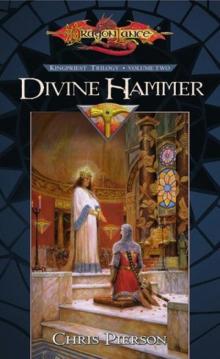 Divine Hammer
Divine Hammer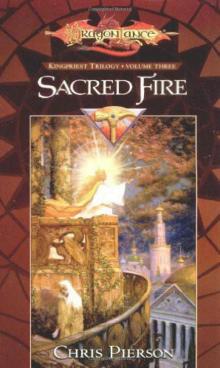 Sacred Fire
Sacred Fire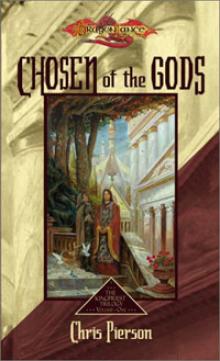 Chosen of the Gods k-1
Chosen of the Gods k-1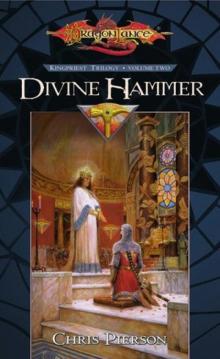 Divine Hammer k-2
Divine Hammer k-2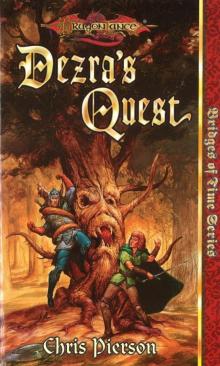 Dezra's Quest
Dezra's Quest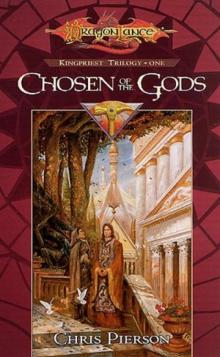 Chosen of the Gods
Chosen of the Gods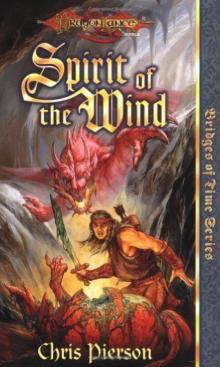 Spirit of the Wind bot-1
Spirit of the Wind bot-1